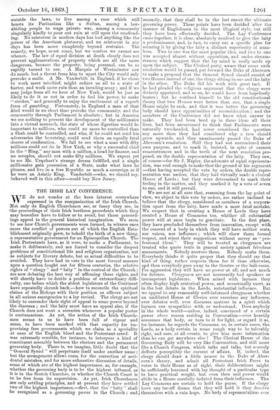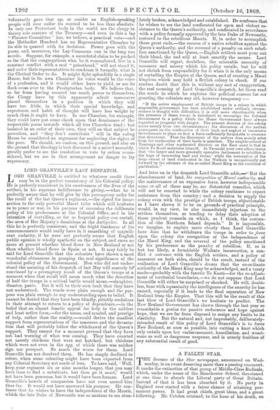THE IRISH LAY CONFERENCE.
WE do not wonder at the keen interest everywhere expressed in the reorganization of the Irish Church. Not only do English Churchmen see, or fancy they see, in vthe proceedings of their Irish brethren precedents which they may hereafter have to follow or to avoid, but those proceed- ings appeal to the general historical imagination. We seem to see how Church governments were formed, to witness once more the conflict of powers out of which the English Esta- blishment originally grew, to behold the birth of a new thing,
representative government for an Episcopalian Church. The Irish Protestants have, as it were, to make a Parliament, to make it deliberately, and are forced to consider the deepest problems of constitutional life and religious organization, not as subjects for literary debate, but as actual difficulties to be avoided. They have had to vote in the most formal manner upon a question fought out for fifteen centuries, the relative Tights of " clergy " and "laity " in the control of the Church ; are now debating the best way of affirming those rights, and will shortly have to decide a problem of extraordinary diffi- culty, one before which the ablest legislators of the Continent have repeatedly shrunk back,—how to reconcile the spiritual claims of the Bishops with their position as officers subject in all serious emergencies to a lay revisal. The clergy are not likely to surrender their right of appeal to some power beyond the diocesan ; and the laity must have an appeal also, if the 'Church does not want a secession whenever a popular pastor is contumacious. As yet, the action of the Irish Church- men seems to us to have been full of vigour and sense, to have been marked with that capacity for im- provising free governments which we claim as a speciality at once of the English blood and the Protestant creed. It was extremely sensible, for instance, to interpose a kind of constituent assembly between the electors and the permanent governing body. There is, we imagine, little doubt that the -" General Synod " will perpetuate itself under another name ; but the arrangement allows room for the correction of acci- dental mistakes, and for more exhaustive discussion of details, some of which are of the highest importance, as, for example, whether the governing body is to be the highest tribunal, as it is in the Scotch Churches, or whether the Church Court is to be free from its supervision. As yet, Irish Churchmen are only settling principles, and at present they have settled two of the highest importance,—first, that the "laity " shall) be recognized as a governing power in the Church ; and secondly, that they shall be in the last resort the ultimate governing power. These points have been decided after the manner of Englishmen in the most illogical style, but still they have been effectually decided. The Lay Conference came together, it is clear, absolutely resolved to give the laity a predominance, and, in fact, to carry out a specific plan for securing it by giving the laity a distinct superiority of num- bers. Two to one was the most popular idea, and two to one was accepted almost without opposition, and under circum- stances which suggest that the lay mind is really made up upon the subject. The Clerical party, aware that some such resolution would be passed, put forward the Duke of Abercorn to make a proposal that the General Synod should consist of two Houses instead of one, the clergy sitting in one and the laity in the other. The Duke did his work with great tact. If he had pleaded the religious argument that the clergy were divinely appointed, and so on, he would have been hopelessly beaten ; but he confined himself to the old constitutional theory that two Houses were better than one, that a single House might be rash, and that it was better the governing body should have opportunities of reconsideration ; and the members of the Conference did not know what answer to make. They had been bred up in those ideas all their lives, had been accustomed to think that Parliaments were naturally two-headed, had never considered the question any more than they had considered why a tree should grow upwards, and they unanimously passed the Duke of Abercorn's resolution. Still they had not surrendered their own purpose, and to mark it, insisted, in spite of earnest remonstrances and in the teeth of the next resolution pro- posed, on the double representation of the laity. They saw, of course—for Sir J. Napier, the advocate of equal representa- tion, was cool enough to make that the ground of his argument —that having accepted the vote by orders, the double repre- sentation was useless, that they had virtually made a clerical House of Lords ; but they were determined to mark their feeling in the matter, and they marked it by a vote of seven to one, and it will prevail.
We are not at all sure that, reasoning from the lay point of view, we object to this vote by' orders, are rather inclined to believe that the clergy, considered as members of a corpora- tion apart from the laity, have made a most fatal mistake.. We suspect that in creating a House of Lords they have created a House of Commons too, whither all substantial power will at once begin to gravitate. In the first place, they have precluded themselves from innovation, except with the consent of a body in which they will have neither seats, nor voices, nor influence ; which will show them formal respect, and reject their suggestions without mercy as " pro- fessional ideas." They will be treated as clergymen are treated who quote texts in general society against frivolous amusements. Nobody answers them. Nobody snubs them. Everybody thinks it quite proper that they should say that kind of thing, rather respects them for it than otherwise, apd then everybody goes away to the theatre or the ball-room. For aggression they will have no power at all, and not much for defence. Clergymen are not necessarily bad speakers or incompetent legislators. When mixed with laymen they often display high oratorical power, and occasionally exert, as in the last debate in the Lords, substantial influence. But we appeal to any reasonably well-informed clergyman whether an undiluted House of Clerics ever exercises any influence, ever debates well, ever discusses matters in a spirit which laymen can sympathize with or understand. Does anybody in the whole world—unless, indeed, convinced of a certain power above reason residing in Convocation—ever heartily reverence that body, or turn to it for light, or regard it as, for instance, he regards the Commons, or, in certain cases, the Lords, as a body certain in some rough way to be tolerably right, and sure, at all events, to give him more information than he can get anywhere else ? The Clerical House of the Governing Body will be very like Convocation, and still more like a Church Congress, which talks and talks, but scarcely deflects perceptibly the current of affairs. If, indeed, the clergy should draw a little nearer to the Duke of Aber- corn's theory, and admit all Protestant Irish Peers to votes in their House as of right, their deliberations might be sufficiently leavened with lay thought of a particular type to have practical weight, but even then real power would abide in a House carefully isolated from their influence. The Lay Commons are certain to hold the purse. If the clergy have any far-off dream that they will hold it they deceive themselves with a vain hope. No body of representatives ever
voluntarily gave that up, or amidst an English-speaking people will ever suffer its control to be less than absolute. In only one Protestant body in the world are the clergy in theory sole masters of the Treasury—and even in this a lay "Finance Committee " has, we believe, a practical veto—and the Methodist Hundred has no Representative Chamber by its side to quarrel with its decisions. Power goes with the purse, and, moreover, the Lay Commons can in the long run secede. Suppose, for example, a sacerdotal claim to be pushed so far that the congregations who, be it remembered, live in a constant conflict with a real " priesthood," will not stand it, and order their representatives to condemn it formally, what is the Clerical Order to do. It might fight splendidly in a single House, but in its own Chamber its voice would be the voice of a profession, and it would either have to yield, or see its flock cross over to the Presbyterian body. We believe that, so far from having secured too much power to themselves, the Clergy have by this apparently adroit manoeuvre placed themselves in a position in which they will have too little, in which their special knowledge, and experience, and habit of thought will have less weight by much than it ought to have. In one Chamber, for example, they could have put some check upon that dominance of the respectable purse towards which all free Churches tend ; but isolated in an order of their own, they will on that subject be powerless, and "they don't contribute " will in the ruling House be considered an argument for neglecting the rights of the poor. We should, we confess, on this ground, and also on the ground that theology is best discussed in a mixed assembly, greatly prefer to see the resolution to vote by orders recon- sidered, but we see in that arrangement no danger to lay supremacy.































 Previous page
Previous page